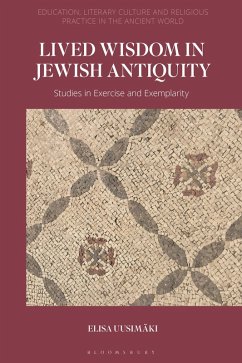Moving away from focusing on wisdom as a literary genre, this book delves into the lived, embodied and formative dimensions of wisdom as they are delineated in Jewish sources from the Persian, Hellenistic and early Roman eras. Considering a diverse body of texts beyond later canonical boundaries, the book demonstrates that wisdom features not as an abstract quality, but as something to be performed and exercised at both the individual and community level.
The analysis specifically concentrates on notions of a 'wise' person, including the rise of the sage as an exemplary figure. It also looks at how ancestral figures and contemporary teachers are imagined to manifest and practice wisdom, and considers communal portraits of a wise and virtuous life. In so doing, the author demonstrates that the previous focus on wisdom as a category of literature has overshadowed significant questions related to wisdom, behaviour and social life. Jewish wisdom is also contextualized in relation to its wider ancient Mediterranean milieu, making the book valuable for biblical scholars, classicists, scholars of religion and the ancient Near East and theologians.
The analysis specifically concentrates on notions of a 'wise' person, including the rise of the sage as an exemplary figure. It also looks at how ancestral figures and contemporary teachers are imagined to manifest and practice wisdom, and considers communal portraits of a wise and virtuous life. In so doing, the author demonstrates that the previous focus on wisdom as a category of literature has overshadowed significant questions related to wisdom, behaviour and social life. Jewish wisdom is also contextualized in relation to its wider ancient Mediterranean milieu, making the book valuable for biblical scholars, classicists, scholars of religion and the ancient Near East and theologians.


